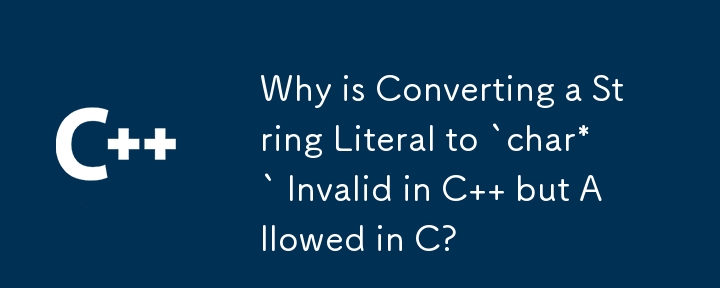

Conversion from String Literal to 'char*' in C vs. C
The C 11 Standard explicitly states that converting a string literal to 'char*' is invalid, while it remains valid in C. This disparity stems from fundamental differences in how the two languages handle string literals.
C Compatibility in C
Historically, C allowed the deprecated implicit conversion from string literals to 'char'. However, in C 11, this conversion was officially removed in favor of treating string literals as 'char const '. This ensures immutability, preventing alterations that could lead to undefined behavior.
Explicit Casting in C
Although the implicit conversion is no longer available in C , an explicit cast to 'char' can still be performed. However, this does not resolve the underlying issue of immutability. Modifying the value pointed to by the 'char' cast from a string literal will still result in undefined behavior.
Safety First in C
By enforcing the correct type ('char const *') for string literals, C prioritizes safety. Attempts to modify the literal will be flagged as errors, eliminating the potential for crashes.
Legacy Code in C
C maintains compatibility with existing code that relies on the implicit conversion from string literals to 'char*'. This decision was likely made to avoid breaking legacy software. However, it highlights the difference in philosophy between C and C when it comes to balancing compatibility and safety.
In summary, the conversion from string literal to 'char' is invalid in C because it violates the principle of immutability. While C allows this conversion for legacy reasons, it is strongly discouraged in favor of using 'char const ' for increased safety.
The above is the detailed content of Why is Converting a String Literal to `char*` Invalid in C but Allowed in C?. For more information, please follow other related articles on the PHP Chinese website!




